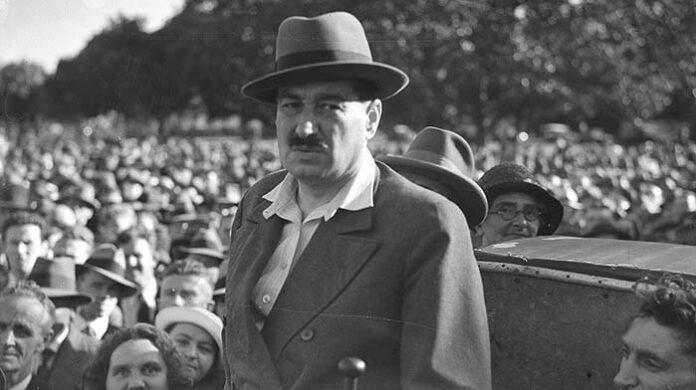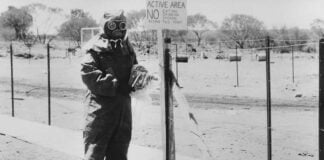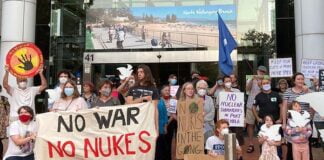Luke Ottavi looks at how the Communist Party launched the 1930s Movement against War and Fascism, continuing our series on war and workers’ resistance
In the face of the threat of war, whether in Ukraine or between the US and China, we can take inspiration from the long history of anti-war struggles in Australia.
The Movement against War and Fascism (MAWAF) began in 1933 as a Communist Party of Australia (CPA) initiative in response to the rise of Nazism in Germany and the growing threat of another World War.
Hitler’s ascension to power in 1933 caused enormous shock as he established a fascist dictatorship and began speeding up German rearmament.
This was especially concerning for those on the left. By the mid-1930s the CPA had become a significant force, with over 3000 members and elected officials in a number of unions.
The CPA was desperate to protect the Soviet Union, which they still saw as a beacon of socialism despite Stalin’s dictatorship, from attack by the fascist powers.
There was a shift in Communist policy, directed from Moscow, to make building opposition to fascism and war the central focus of communist activity. This was driven by Russia’s new foreign policy goal of alliances with Western powers against the threat of a German attack.
The CPA began to move away from its ultra-left “third period” policies and their extreme hostility to the Labor Party. This allowed them to work much more effectively alongside left-wing Labor Party members and other militant unionists.
Even in 1933, the anti-war movement in Melbourne was able to organise 18 separate suburban meetings on 1 August, with the Labor-aligned mayor of Collingwood chairing one meeting in the local town hall.
Left-leaning members of the Labor Party, workers, and community members were also drawn into MAWAF’s activities.
Many saw the election of the conservative government of Joe Lyons in 1931 as a step towards fascism, due to repression aimed at the labour movement and its support of the British government’s policy of appeasement towards Hitler and Mussolini. Lyons even visited Mussolini in Italy in 1937 on a diplomatic mission.
In response to the Duke of Gloucester and an entourage of military advisers from Britain opening the Shrine of Remembrance in Melbourne for Victoria’s centenary in November 1934, MAWAF planned their second National Anti-War Congress.
The Lyons government had planned a massive armaments program, and anti-war activists saw the attendance of leading British military advisers as a smokescreen for war preparations.
MAWAF needed a hall for their event, but their efforts were repeatedly frustrated by Victorian Police Commissioner Thomas Blamey (who was secretly involved in a far right group known as the White Army) who warned municipal councils that it would be an offence under the Crimes Act to host the meeting.
Eventually, Port Melbourne council refused to submit to pressure and MAWAF had their venue.
To attract as many people as possible, MAWAF requested an international speaker from the World Committee Against War and Fascism.
This was established in 1928 by Willi Munzenberg at Stalin’s orders. It decided to send Czech writer Egon Kisch—well-known in Europe as the “roving reporter” or, in a mistranslation, “the rampaging reporter from Prague.”
Kisch was a Jewish communist who was also a minor literary celebrity. He was also a chain smoker who enjoyed the high life, having grown up in an upper class family in Prague, known for his sense of humour and wit in his writings.
In the wake of the Reichstag fire of February 1933, Kisch was arrested and imprisoned by the Nazis.
As a Czech citizen he was expelled from Germany, but some of the friends and comrades he was arrested with were beaten and murdered.
Kisch was selected to go to Australia because of his passable English skills and his experience under the Nazis to speak on the threat of war.
Police Commissioner Blamey, together with then Attorney General and future Prime Minister Robert Menzies, thought that preventing Kisch from entering Australia would help ensure the MAWAF Congress was a flop.
Menzies was not prepared to take any risks of disruption whilst the Duke of Gloucester and Britain dignitaries were in the country.
Kisch denied entry
The initial attempt to prevent Kisch from entering Australia at Fremantle on 6 November 1933 was through searching his belongings in the hope of finding communist material—which was prohibited from import to Australia under law.
Regulations under the Customs Act prohibited literature advocating “the overthrow by force or violence of the established government of the Commonwealth or of any State or of any other civilised country.”
Naturally, this included the bulk of communist material. The Act also saw people fined for selling left wing-literature or distributing leaflets, and restrictions on MAWAF’s newspaper War! What for?
Kisch was too experienced for this simple trap and the authorities found nothing. However, they then prevented him from landing under the Immigration Act because he was deemed an “undesirable person” based on information received through “official or diplomatic channels.”
Unbeknown to Kisch, he had been banned from entering Britain by Special Branch in London—an arm of MI5. This ban was politically motivated due to Kisch’s activities as a communist.
Australian authorities had wired London Special Branch requesting information on Kisch, in the hope there were grounds for preventing his landing.
The logic was that if Kisch was banned from entering Britain then he should surely be banned from entering Australia.
Kisch stayed aboard the Strathaird until it docked in Melbourne on 12 November, a few days after the Congress he was meant to speak at finished.
To help Kisch, a legal team had been assembled with support from the Communist Party-linked International Labour Defence.
Undoubtedly on legal advice, Kisch forced his landing from the Strathaird by jumping from the ship’s deck onto the port, breaking his leg in the process.
Menzies ordered Kisch back on board without medical attention and demanded he be taken to Sydney and then on the first boat back to Europe—even if it sailed under a Nazi flag.
These spectacular events saw the Australian media jump onto the story, making national headlines. The Lyons government was questioned relentlessly by Labor MPs in parliament.
Kisch went all the way to the High Court to challenge his exclusion and won.
However, Menzies was determined to prevent Kisch from travelling around Australia.
Under the White Australia policy a “dictation test” was used to prevent non-European immigrants from entering Australia, since the British government was opposed to explicit racial exclusion. Would be immigrants were required to take down 50 words in any European language chosen by an immigration officer.
On arrival in Sydney, this test was now turned on Kisch. Given he was a known polyglot, the authorities quizzed him in Scots Gaelic. Kisch didn’t attempt to answer.
Kisch was again arrested, but an application for bail was successful.
Again, Kisch went to the High Court and won, on the basis that Scots Gaelic was not the national language of any European country and so could not be used in the dictation test.
After his release, 18,000 people greeted Kisch in the Domain in Sydney to hear him speak against fascism and war.
Before Kisch landed, MAWAF had set up the Kisch Reception Committee (which was turned into the Kisch Defence Committee when he was arrested) to attract as many people as possible to the Congress and Kisch’s speaking tour.
Committee members spoke at factory meetings during the day, and at night at trade union, Labor Party, and Church meetings.
Many organisations elected delegates to send to the Congress, laying the foundation for a mass movement against war.
In Victoria MAWAF had set up suburban branches, and delegates would meet once a month to discuss their plans. A women’s committee was also established that carried out its own activities.
This grassroots mobilisation, combined with the publicity the government’s attempt to exclude him generated, meant that once Kisch was released thousands came to hear him speak.
Kisch pointed out that Hitler was a threat to everyone concerned with upholding decent human values, not just communists, and repeatedly called for united action against fascism.
On the back of the successful speaking tour, Kisch famously said “My English is broken, my leg is broken, but my heart, that is not broken.”
The CPA’s move away from sectarianism to begin working with Labor Party members and others on the left paid off. But in doing so it adopted a popular front approach, watering down its politics and embracing nationalism.
Following ever changing instructions from Moscow, it began to argue that the League of Nations (the forerunner of the United Nations) and diplomatic agreements between capitalist states could prevent war. By 1937 the CPA had embraced nationalism, describing itself as “the real inheritor of the true Australianism… of the Dunmore Langs, Parkeses and Wentworths, of the heroic fighters of the Eureka stockade, of the gallant anti-conscription army.”
But such “left” nationalism disarms efforts to oppose military spending and accepts the idea that the Australian state could play a positive role in world affairs.
The biggest threat before us is Albanese and Labor’s drive towards war with China, all so Australia maintains its status as the dominant imperialist power in the local region.
The AUKUS agreement and Australia’s backing for the US is fuelling the threat of war.
A war between the US and China—both nuclear powers—would be catastrophic for workers not only in China, Taiwan, and the US, but workers in Australia and around the world.
We need to build a movement that opposes AUKUS, the nuclear submarines and the spending of hundreds of billions of public money on militarisation during a cost-of-living crisis.
Failure to build this movement now will result in much more than broken legs, and may well result in Australia joining another horrifying war.






